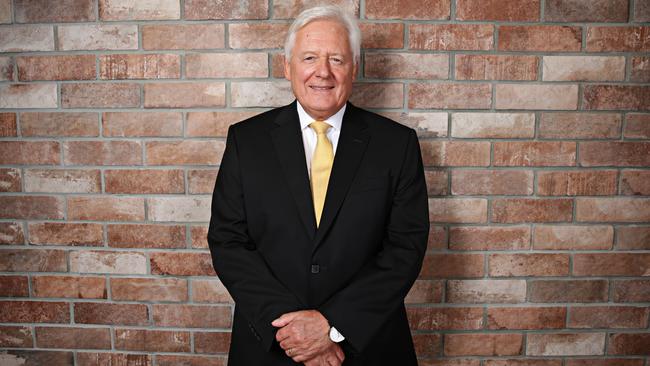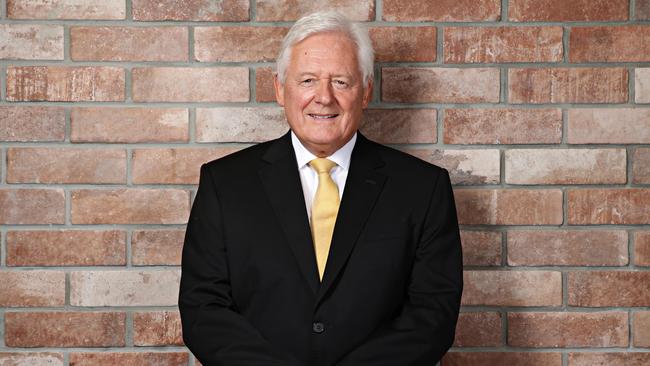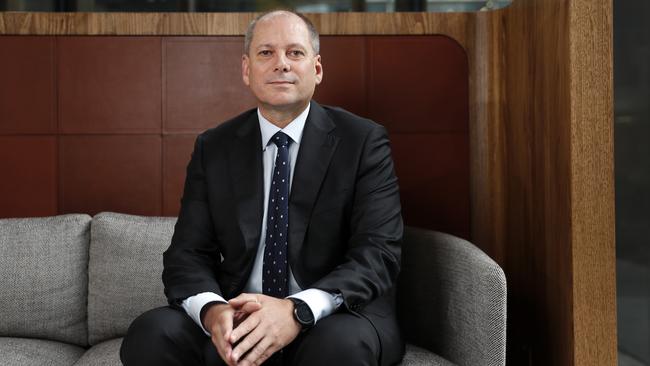Westpac chairman John McFarlane fronts shareholders at AGM, defends fossil fuel financing as bank hit with first strike
Westpac faces a difficult task placating investors aggrieved by writedowns, poor share performance and the bank’s lending to the fossil fuel sector.

Westpac faces a difficult task placating investors aggrieved by writedowns, poor share performance and the bank’s lending to the fossil fuel sector – with investors on Wednesday delivering a first strike against the company’s remuneration report. Just over 30 per cent of votes went against the report, well in excess of the 25 per cent needed for a first strike. The vote comes after a 20 per cent tumble in the share price in recent weeks following a disappointing full-year result.
In addressing the protest vote, Westpac chairman John McFarlane admitted he shared shareholder concerns about the lender’s performance.
“What we were putting forward with respect to executive remuneration was not aggressive, and, in fact, was well below our competitors, as it should be given the nature of the performance,” Mr McFarlane said.
“We thought we struck a right balance here … This is a way of shareholders their expressing concern … and now we’ve got a strike against it. I’m concerned about underlying performance, and I know shareholders are concerned about it.”
The Australian Shareholders Association voted proxies against the bank’s remuneration report, with CEO Rachel Waterhouse saying it was “one clear way for shareholders to express their continued dissatisfaction with Westpac’s performance”.
Mr McFarlane, who was appointed chairman a little under two years ago, also defended the lender’s financing of fossil fuel projects, saying the bank was “doing the right thing” in finding a middle ground with its funding policy, as he and chief executive Peter King faced a grilling from angry shareholders.
Addressing an avalanche of questions over its commitment to net zero amid continued financing of thermal coal and oil and gas projects, Mr McFarlane said an abrupt end to fossil fuel financing was not the right call for Australia.
“An easy call for us would be to not be in this exposure at all … there is a range of positions here from those who wish an acceleration (of the exit from fossil fuels) and those who wish us to continue to finance,” Mr McFarlane said.

“And of course, some of this is consistent with government policy, both federally and in the states. So whatever we do here, we’re going to be in trouble with somebody.
“We’re trying to find the best position here and I think we’ve done reasonably well. Nearly 80 per cent of our lending is to renewables and not to fossil fuels. In finding that middle ground, in all honesty, I think we‘re doing a pretty good job, and we’re doing a better job than some of our competitors.”
The move by European banks to completely exit fossil fuel financing would not translate across to the local market, he warned.
“It’s happened at a number of European banks but in Australia it’s not the right answer.
“The country needs us to finance various parts of sectors, including electricity generation and we know that gas is going to be with us for some time to come … we’ve taken the view that we want to reduce our exposure to fossil fuels, and we’re coming out of coal (by 2030) but we want to honour our obligations to the industries and the customers we serve.”
Performance review
Earlier in the meeting Mr King acknowledged the negative impact on shareholder returns from the move to simplify the business, saying that after a year of getting its house in order, Westpac will now direct its energy to customers and rebuilding its long-term value.
While warning that low interest rates and intense competition will continue to impact sector margins, Mr King sought to reassure shareholders, saying changes implemented over the past 18 months had made the bank “simpler and stronger”.
“The company we are building is profoundly different to the Westpac of two years ago – and it needs to be,” Mr King said.
“We are clear on what we need to achieve, to lead the company through this formative time. Strengthening risk management and risk culture is a clear priority.”
Mr King was appointed CEO in April 2020, after holding the acting CEO position from December 2019 following Brian Hartzer’s exit. Mr King was the lender’s chief financial officer from 2014.

Mr McFarlane apologised for the bank’s poor full-year result, handed down on November 1, and subsequent share price performance, as he confirmed a CEO succession plan will kick off in 2022.
“A CEO succession is a very important priority for the board. But succession planning for Peter King, since he’s only been recently appointed, is probably a little premature.
“We were going to consider it this calendar year but we decided it wasn’t the time. It’s definitely something we will begin next year.”
The full-year result, which saw Westpac post lower-than-expected cash earnings on intensifying margin pressures, was disappointing, Mr McFarlane said.
“(This has led) to a drop in our market value for which I apologise unreservedly on behalf of the board.
“Be assured, remedial action has been instituted by the board and management to improve performance going forward, including a plan to reduce costs materially over the next three years without jeopardising investment in infrastructure and revenue opportunities.
“There is some scepticism as to whether we can achieve this cost outcome. The board is nevertheless confident that we will be able to execute this, and we fully expect costs to be down in 2022,” Mr McFarlane said.
Challenges ahead
Westpac continues to face considerable challenges, he warned.
“I indicated (last year) that we lacked strategic focus and were operating businesses that no longer made strategic sense. Our financial returns and market share had been weakening over recent years, caused by bureaucratic management processes, alongside operational and technological complexity.
“We were also faced with the need to resolve material longstanding legal, risk and regulatory issues, as well as discovering new issues as we carry out our investigations.”
The bank is rebuilding its financial crime processes and systems following its anti-money laundering breaches, Mr King said. Those breaches saw it cop a $1.3bn penalty from Austrac in 2020.
“As part of our “fix” agenda, we are reviewing past practices and have uncovered further issues,” Mr King said.
“I know these are disappointing. Nevertheless, it is vital that we work hard to resolve and close them out, to restore the trust that you and our customers should have in us.”
While the “fix” and “simplify” priorities in its multi-year overhaul remain, the bank’s focus is increasingly turning to the “perform” element, he added.
“I am confident the changes made over the last 18 months set us up to deliver. The scale of change is taking time and significant investment. I’m acutely aware of the impact on shareholder returns and to the value of Westpac shares.
“Many shareholders have written to us and I understand your desire that we move quicker to fix our issues. We will continue to challenge ourselves on speed of execution while balancing the need to ensure that change is enduring.
“As CEO, I have accountability for delivering the plan. Together with my executive team, I am confident that we’ll achieve our targets, particularly on reducing costs and improving returns.”
The shareholder grilling comes a day after Mr McFarlane trumpeted the lender’s progress on its simplification plan.
Mr McFarlane on Tuesday said the lender’s asset sale program was delivering results faster than expected, giving a boost to its simplification project.
The chairman said he had a “dead simple” message on the three-year turnaround plan.
“A, we’re going to get it right, and B, we’re going to get it done,” he said.
But shareholders have suffered with the faltering share price, which has plunged 20 per cent since late October and is up just 5 per cent over the past 12 months. This compares to gains at the other big banks of between 17 and 21 per cent over the same period.






To join the conversation, please log in. Don't have an account? Register
Join the conversation, you are commenting as Logout